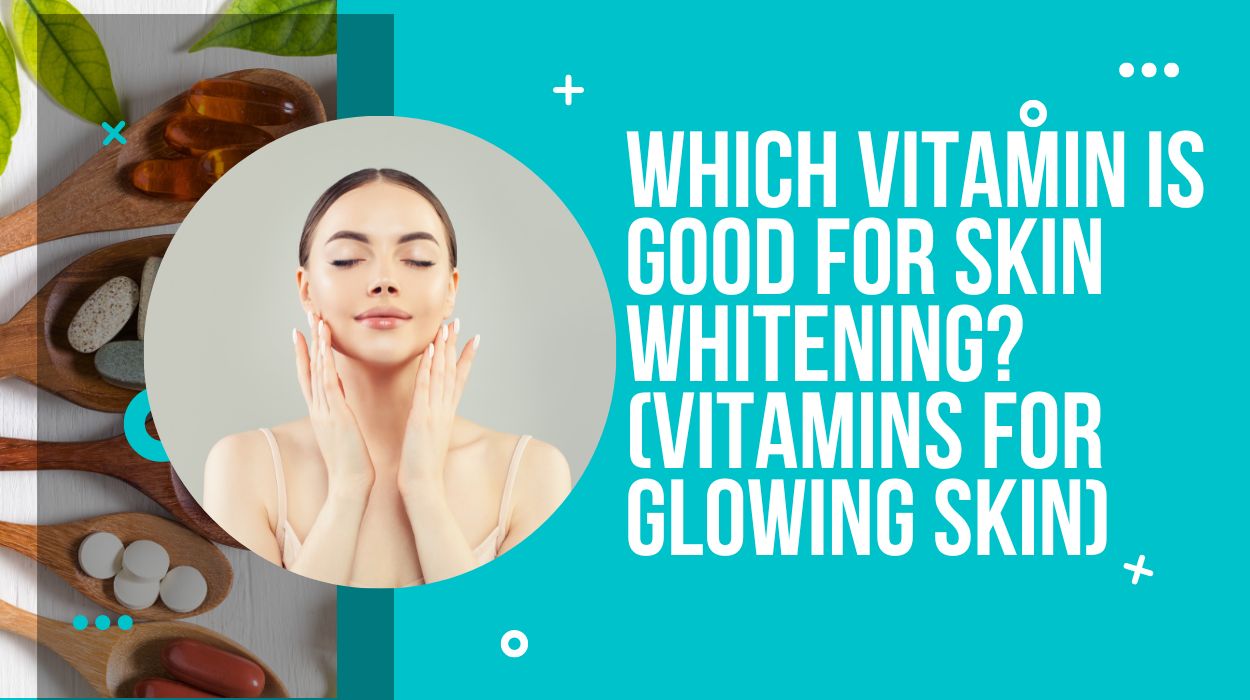Vitamins are a group of organic elements that are essential for human health. They can be made in the body from other substances, or they can be found in food. One of the most well-known vitamins is Vitamin C, often used to fight colds and flu. But Vitamin C has another vital role: helping to keep your skin healthy and white.
Skin whitening has been a topic of great interest for centuries. Today, we have various options to lighten our skin, ranging from over-the-counter creams to invasive procedures. But which is the best option? Today, we’re going to talk about introducing Vitamin C, which is suitable for skin whitening.
Let’s look at the different vitamins that can whiten your skin!
The Efficiency of Vitamin C for Skin Whitening:

Vitamin C is an important skin whitening ingredient. It is a crucial part of the collagen synthesis process, which gives your skin its youthful appearance and keeps it looking healthy and radiant.
Vitamin C, which is also known as ascorbic acid, is a well-known and influential whitening ingredient. It’s commonly used to reduce the appearance of spots and breakouts. Many commercial skincare products today contain this ingredient. But did you also know that Vitamin C can be used to lighten your skin?
When you’re looking for a cream that can whiten your skin, getting a product that contains Vitamin C is a great place to start. Most over-the-counter whitening products will contain Vitamin C as an active ingredient or a bonus.
The Advantages of Vitamin C for Whitening Skin:
Vitamin C is an important skin whitening ingredient. It is a crucial part of the collagen synthesis process, which gives your skin its youthful appearance and keeps it looking healthy and radiant.
When you’re looking for a cream that can whiten your skin, you must see on the product that it doesn’t contain much Vitamin C which can harm your body. Select products with moderate nutrients in them or natural components.
1. Vitamin C is the Ideal Whitening Ingredient:
Vitamin C is a natural product found in the human body. It is used by the body to make collagen, which gives the skin its youthful appearance and keeps it looking healthy and radiant.
2. Vitamin C is Gentle Enough for All Skin Types and Ages:
Many anti-aging creams, makeup products, and cosmetics contain harsh chemicals that can peel or irritate sensitive skin. With Vitamin C, you can avoid these risks. All you need is a small amount of this whitening ingredient, and your skin will see the benefits.
3. It’s Affordable:
Most whitening products require a large amount of Vitamin C to be effective. This can increase the cost and make the product unfeasible for sensitive skin. With Vitamin C, you only need a small amount to see results. This is an excellent option for people on a tight budget who want to lighten their skin without spending money.
4. It’s Easy to Find:
Vitamin C is a common whitening ingredient found in most skincare products. This means that you can find Vitamin C-based products easily, no matter where you’re shopping.
It’s not limited to certain skincare stores or retail locations so you can find it anywhere. At the same time, other whitening products are not widely available.
5. Vitamin C is Safe:
The whitening process itself is very safe for the skin. The active ingredient in Vitamin C, ascorbic acid, is a natural and effective whitening ingredient. It lightens the skin and keeps it looking healthy and radiant. It’s used as an ingredient in many commercial skincare products.
However, it is essential to avoid any products with excessive amounts of Vitamin C in them. This Vitamin Can be harsh on the skin, causing sunburn-like symptoms and irritation. It’s best to stick to whitening products that contain some form of Vitamin C. You won’t feel any side effects from using this ingredient.
Other Vitamins That Help in Skin Lightening:
There are other types of vitamins that help in skin lightening. These are Vitamin B complex, Vitamin A, Vitamin D, K, etc. They help in skin lightening. These vitamins help in collagen synthesis and protection of the cells from free radicals. They also help in cell growth and repair.
The following are some other vitamins that help in skin whitening:
1. Vitamin D3:

It helps in skin lightening by helping in collagen synthesis. It also reduces cell growth and helps in cell repair. Vitamin D3 is available in the form of supplements and topical products. A topical product will be helpful for the skin.
This happens because Vitamin D3 acts on the immune system. It will help in reducing wrinkles, skin blemishes, and skin darkening. It helps in skin lightening by keeping the skin hydrated. It also helps in healing the skin and reducing inflammation.
2. Vitamin A:

Vitamin A helps in cell growth and repair and protects the cells from free radicals. It helps make keratin, which is the substance that gives a healthy, bright, and radiant look to the skin. Vitamin A helps the skin to be hydrated by helping in the production of ceramides and hyaluronic acid.
It helps in reducing skin blemishes. Overall it eliminates oily skins and is a crucial vitamin for those who suffer from many face issues.
3. Vitamin K2:

Vitamin K2 can help in the regeneration of the skin. It gives a boost in the production of collagen and skin repair. Vitamin K2 is also known to help produce a protein called osteocalcin, which acts as an anti-inflammatory agent and helps in bone formation.
This is extremely important in the ageing process. It also helps keep the skin hydrated as it reduces the amount of sebum produced by the sebaceous glands. The result of all these qualities ends with an oil-free skin.
4. Vitamin B6:

Vitamin B6 helps in keeping the skin healthy. It helps in cell repairs and helps in the production of collagen. Vitamin B6 helps produce elastin, which is the substance that gives the skin elasticity and firmness. It also helps increase the production of lactic acid, which helps keep the skin looking fresh and young.
People with acne can apply a vitamin B6-based product to speed up the healing process. It helps in improving skin texture. It helps in eliminating the wrinkles on the skin.
FAQs
1. Is it true that vitamin E might help you whiten your skin?
Is it true that Vitamin E helps to lighten the skin? Some people bleach their skin by combining Vitamin E with lemon juice or other chemicals. There is no proof that this works, and these products can have adverse side effects such as skin damage.
2. Is it okay if I take vitamin E every day?
1100 IU synthetic vitamin E or 1500 IU natural vitamin E. When administered orally, vitamin E is probably safe for most people when consumed at levels less than 1000 mg per day. With higher doses, the danger of side effects increases.
3. What foods do you eat to get a darker complexion?
Foods high in beta carotenes, such as carrots, sweet potatoes, spinach, and peas, are good sources of vitamin A. Vitamin A, which also serves as an antioxidant, is thought to be the key to melanin formation more than any other vitamin.
4. What foods do you consume to achieve a darker complexion?
Vitamin A is found in foods strong in beta carotenes, such as carrots, sweet potatoes, spinach, and peas. Some experts believe that vitamin A, which also serves as an antioxidant, is more important than any other vitamin in melanin synthesis.
You May Also Like To Read:
Skin Whitening Body Washes in India
Conclusion:
Several vitamins can be used to maintain healthy skin. Taking Vitamin E helps in skin whitening, while vitamin K3 acts by decreasing the formation of melanin. Therefore, it is advised that people increase their intake of Vitamin K3 to keep the skin healthy and free from pigmentation.
And many more vitamins help in several things to benefit your skin. You must opt for the one which best suits you and include them regularly in your diet.


